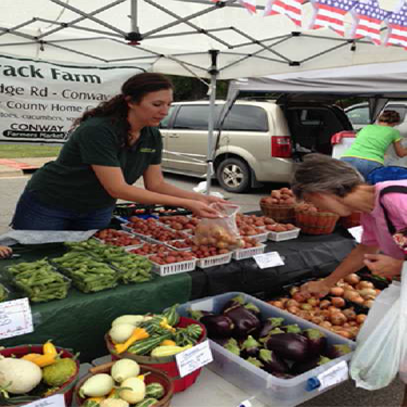NOTE: The Arkansas SNAP-Ed program, which provided high-quality, resourceful nutrition
education to Arkansans for more than 30 years, ended all programming on Sept. 30,
2025, as a result of the elimination of federal funding following the passage of Public
Law 119-21, the budget reconciliation bill.
____________
Supplemental Nutrition Assistance Program - Education (SNAP-Ed)
Nutrition and physical activity can improve your well-being.
The typical Arkansas diet is high in fat and low in fruits, vegetables, and whole grains. Poor diet and too little physical activity can contribute to the development of serious health problems.
Fortunately, the Arkansas SNAP-Ed program helps consumers make better choices about food to live healthier.

What is Arkansas SNAP-Ed?
Arkansas SNAP-Ed provides nutrition education to food stamp recipients and those individuals and families who are eligible to receive nutrition assistance. As a result of a partnership between the University of Arkansas System Division of Agriculture, the U.S. Department of Agriculture's Food and Nutrition Service, the Arkansas Department of Human Services, and county governments, SNAP-Ed is helping Arkansans eat better in order to live better.
Find a SNAP-Ed Program Near You
Contact your local county Extension agent for details on how you or your school can participate.
Sign up for the Arkansas SNAP-Ed Newsletter
You'll get delicious, low-cost recipes, nutrition tips, and ideas for physical activity delivered once a month in the Arkansas SNAP-Ed Newsletter. Unsubscribe at any time.
Want to save money while preparing healthy meals?
Visit our Arkansas Foods Blog for budget-friendly recipes and tips, as well as tried and true nutrition information to help you make better choices when deciding what to feed your family.
 The goal of SNAP-Ed is to provide educational nutrition programs that help SNAP participants
and those eligible for SNAP benefits (formerly food stamps) make healthier food choices
and adopt active lifestyles that are consistent with the Dietary Guidelines for Americans
and USDA Food Guidance System. The program is designed to teach skills that help participants
to:
The goal of SNAP-Ed is to provide educational nutrition programs that help SNAP participants
and those eligible for SNAP benefits (formerly food stamps) make healthier food choices
and adopt active lifestyles that are consistent with the Dietary Guidelines for Americans
and USDA Food Guidance System. The program is designed to teach skills that help participants
to:
- Buy and prepare healthful meals and snacks based on the Dietary Guidelines for Americans and USDA Food Guidance System
- Become more physically active
- Improve safe handling, preparation, and storage of food
- Develop spending and savings plans to make food dollars last throughout the month
 SNAP-Ed nutrition educators live in the communities they serve, and they understand
the needs of the families in their county. They deliver SNAP-Ed training in a variety
of ways, including:
SNAP-Ed nutrition educators live in the communities they serve, and they understand
the needs of the families in their county. They deliver SNAP-Ed training in a variety
of ways, including:
- School programs
- Hands-on learning experiences
- Food demonstrations
- Small group discussions
- Educational displays
- Handouts
- Newsletters
- Cooking schools
 SNAP-Ed works in partnership with the Arkansas Department of Human Services offices,
Arkansas Department of Health WIC clinics, Head Start programs, senior citizen centers,
commodity distribution sites, and public schools where half or more of the students
are eligible for free or reduced price lunch.
SNAP-Ed works in partnership with the Arkansas Department of Human Services offices,
Arkansas Department of Health WIC clinics, Head Start programs, senior citizen centers,
commodity distribution sites, and public schools where half or more of the students
are eligible for free or reduced price lunch.
Access Arkansas
Quick and easy way for the people of Arkansas to find answers to their questions regarding
health and nutrition programs and find out whether they qualify for nutrition assistance.
Arkansas Food Bank Service
Supplies food pantries and other agencies that distribute food boxes and meals to
those in need. This site will help you find a pantry or agency nearest you.
Arkansas ADH WIC Program
Provides food, nutrition education or counseling, and resources for health services
for eligible pregnant, breastfeeding and postpartum women, infants, and children to
age 5.
Arkansas Department of Education Nutrition Unit
Information on Healthy School Initiative with information on standards and school
wellness policies.
ChooseMyPlate.gov
Food and nutrition education materials for educators/teachers, health care professionals,
partners, parents, children, adults, preschoolers, college students.
MyPlate Core Nutrition Messages
Use these resources as part of nutrition education to help increase consumption of
whole grains, fat-free and low-fat (1% or less) milk, and fruits and vegetables, and
encourage child feeding practices that encourage healthy eating habits.
How to Get Food Help
Information from the USAGov site about who qualifies for all their food assistance programs and how to apply
for assistance.
USDA Food and Nutrition Service
Link to federal portal to nutrition assistance programs and nutrition education resources.
SNAP-Ed Connection
A dynamic online resource center for SNAP-Ed programs. Includes nutrition education
materials and a recipe finder.
State and National Data & Research
ACHI BMI State, District and School Reports
Obesity and school BMI Initiative data reports of the Arkansas public schools who
participated in the statewide body mass index (BMI) assessments.
USDA Food and Nutrition Service Research and Analysis;
Descriptions of studies, research, and evaluation of projects that respond to the
needs of policy makers and managers and help ensure that nutrition assistance programs
achieve their goals effectively.
USDA National Institute of Foods and Agriculture
Provides access to reports produced by CSREES/Extension/land-grant universities regarding
SNAP-Ed and ASNNA and facilitates communication between state, regional, and national
staff within the Land-Grant University System and among ASNNA members.
USDA Economic Research Service
Research data and reports based on the effectiveness of SNAP (food stamp) program.